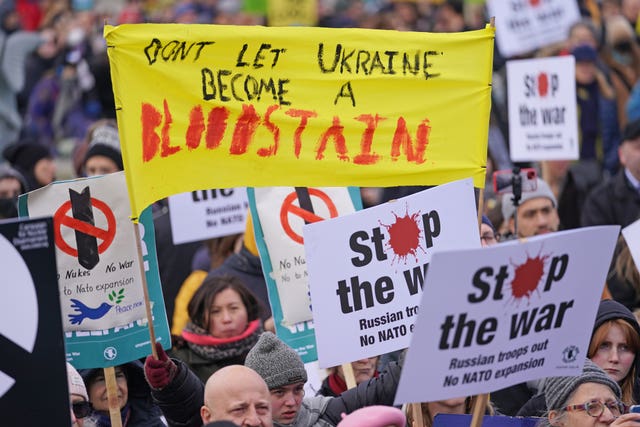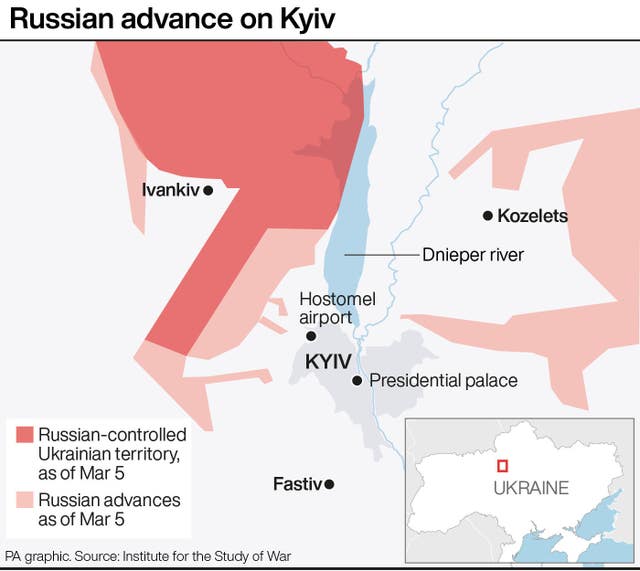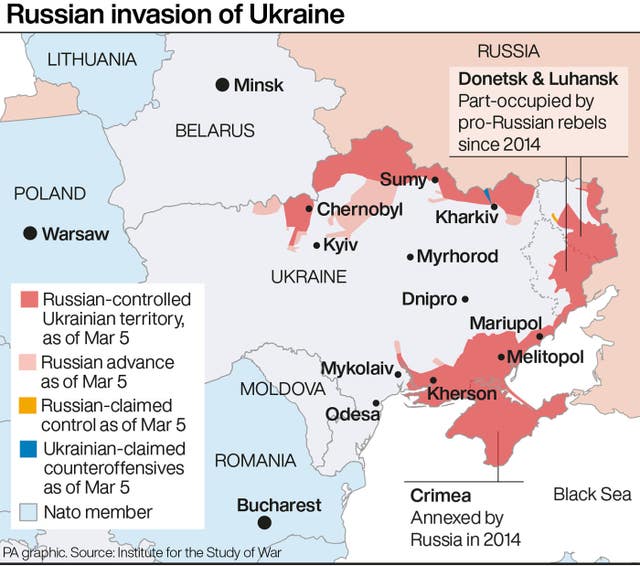
Ben Kentish 10pm - 1am
6 March 2022, 19:54

The news dashed hopes of progress in easing, nevertheless ending the war in Ukraine, which is now in its 11 day.
A second attempt to evacuate civilians from a besieged city in southern Ukraine collapsed amid renewed Russian shelling, while Russian President Vladimir Putin turned the blame for the war back on Ukraine and said Moscow’s invasion could be halted “only if Kyiv ceases hostilities”.
Food, water, medicine and almost all other supplies were in desperately short supply in the port city of Mariupol on Sunday, where Russian and Ukrainian forces had agreed to an 11-hour cease-fire that would allow civilians and the wounded to be evacuated. But Russian attacks quickly closed the humanitarian corridor, Ukrainian officials said.
“There can be no ‘green corridors’ because only the sick brain of the Russians decides when to start shooting and at whom,“ Interior Ministry adviser Anton Gerashchenko said on Telegram.
The news dashed hopes that more people could escape the fighting in Ukraine, where Russia’s plan to quickly overrun the country has been stymied by fierce resistance. Russia has made significant advances in southern Ukraine and along the coast, but many of its efforts have become stalled, including an immense military convoy that has been almost motionless for days north of Kyiv.
Ukrainian President Voldymyr Zelensky rallied his people to remain defiant, especially those in cities that Russian soldiers have entered.
“You should take to the streets! You should fight!” he said on Saturday on Ukrainian television. “It is necessary to go out and drive this evil out of our cities, from our land.”
Mr Zelensky also asked the US and Nato countries to send more warplanes to Ukraine, though that idea is complicated by questions about which countries would provide the aircraft and how those countries would replace the planes.
The war, now in its 11th day, has caused 1.5 million people to flee the country. The head of the UN refugee agency called the exodus “the fastest-growing refugee crisis in Europe” since the Second World War.
As he has often done, Mr Putin blamed Ukraine for the war, telling Turkish President Recep Tayyip Erdogan on Sunday that Kyiv needed to stop all hostilities and fulfil “the well-known demands of Russia”.
Mr Putin launched his attack with a string of false accusations against Kyiv, including that it is led by neo-Nazis intent on undermining Russia with the development of nuclear weapons.
The Russian leader also told Mr Erdogan he hoped Ukraine “would show a more constructive approach (to talks), fully taking into account the emerging realities”. A third round of Russia-Ukraine negotiations is scheduled for Monday.

Mr Putin and French President Emmanuel Macron spoke about the nuclear situation in Ukraine, which has 15 nuclear reactors and was the scene of the 1986 Chernobyl nuclear disaster.
The men agreed in principle to a “dialogue” involving Russia, Ukraine and the UN’s atomic watchdog, according to a French official who spoke on condition of anonymity, in line with the presidency’s practices. Potential talks on the issue are to be organised in the coming days, he said.
Mr Putin also blamed the fire last week at the Zaporizhzhia nuclear power station, which Ukrainian officials said was caused by Russian attackers, on a “provocation organised by Ukrainian radicals”.
“Attempts to shift responsibility for this incident onto the Russian military are part of a cynical propaganda campaign,” he said, according to the French official.
It came as the International Atomic Energy Agency said Russian forces were tightening their grip on the station, Ukraine’s largest, that they seized last week.
The director general of the agency, Rafael Mariano Grossi, said on Sunday that Ukrainian staff members are now required to seek approval for any operation, even maintenance, from the Russians, and that they have impeded normal communications by switching off some mobile networks and internet at the site.

Ukraine’s regulatory authority said that phone lines, as well as emails and fax, are no longer working. Mr Grossi said he is “extremely concerned about these developments”, adding that for the station to operate safely, “staff must be allowed to carry out their vital duties in stable conditions, without undue external interference or pressure”.
International leaders, as well as Pope Francis, appealed to Mr Putin to negotiate.
In a highly unusual move, the Pope said he had dispatched two cardinals to Ukraine, saying the Vatican would do everything it could to end the conflict.
“In Ukraine, rivers of blood and tears are flowing,” the pontiff said in his traditional Sunday blessing. “This is not just a military operation, but a war that sows death, destruction and misery.”
After the cease-fire in Mariupol failed to hold on Saturday, Russian forces intensified their shelling of the city and dropped massive bombs on residential areas of Chernihiv, a city north of Kyiv, Ukrainian officials said.

The handful of residents who managed to flee Mariupol before the humanitarian corridor closed said the city of 430,000 had been devastated.
“We saw everything: houses burning, all the people sitting in basements,” said Yelena Zamay, who fled to one of the self-proclaimed republics in eastern Ukraine held by pro-Russian separatists. “No communication, no water, no gas, no light, no water. There was nothing.”
British military officials compared Russia’s tactics to those Moscow used in Chechnya and Syria, where surrounded cities were pulverised by airstrikes and artillery.
“This is likely to represent an effort to break Ukrainian morale,” the UK Ministry of Defence said.
Mr Zelensky reiterated a request for foreign protectors to impose a no-fly zone over Ukraine, which Nato so far has ruled out because of concerns such an action would lead to a far wider war.
“The world is strong enough to close our skies,” Mr Zelensky said on Sunday in a video address.

The day before, Mr Zelensky pleaded with American politicians in a video call to help get more warplanes to Ukraine.
US officials say Washington is discussing ways to get the planes to Ukraine in a complex scenario that would include sending American-made F-16s to former Soviet bloc nations, particularly Poland, that are now members of Nato. Those countries would then send Ukraine their own Soviet-era MiGs, which Ukrainian pilots are trained to fly.
But because of production backlogs on the US warplanes, the Eastern European nations would essentially have to give their MiGs to the Ukrainians and accept US promises that they would get F-16s as soon as that was possible. Adding to the difficulties is the fact that the next shipment of F-16s is destined for Taiwan, and the US Congress would be reluctant to delay those deliveries.
The Russian military has warned Ukraine’s neighbours against hosting its warplanes, saying that Moscow may consider those counties part of the conflict if Ukrainian aircraft fly combat missions from their territory.
The death toll remains lost in the fog of war. The UN says it has confirmed just a few hundred civilian deaths but also warned that the number is a vast undercount.
Oleksiy Arestovich, an adviser to Mr Zelensky, said Ukrainian officials and international humanitarian organisations were working with Russia through intermediaries to establish humanitarian corridors from Bucha and Hostomel, which are Kyiv suburbs where there has been heavy fighting.
Ukraine’s military is greatly outmatched by Russia’s, but its professional and volunteer forces have fought back with fierce tenacity. In Kyiv, volunteers lined up Saturday to join the military.
Even in cities that have fallen, there were signs of resistance.
Onlookers in Chernihiv cheered as they watched a Russian military plane fall from the sky and crash, according to video released by the Ukrainian government. In Kherson, hundreds of protesters waved blue and yellow Ukrainian flags and shouted: “Go home.”

Russia has made significant advances in southern Ukraine as it seeks to block access to the Sea of Azov. Capturing Mariupol could allow Moscow to establish a land corridor to Crimea, which Russia annexed from Ukraine in 2014 in a move that most other countries considered illegal.
The West has broadly backed Ukraine, offering aid and weapon shipments and slapping Russia with vast sanctions. But no Nato troops have been sent to Ukraine, leaving Ukrainians to fight Russian soldiers alone.
Russia’s economy has been devastated by the sanctions, with the rouble plunging in value and dozens of multinational companies ending or dramatically scaling back their work in the country.
On Sunday, American Express announced it would suspend operations in Russia, as well as in Russian-allied Belarus. Globally issued American Express cards will no longer work at stores or cash machines in Russia, the company said, and American Express cards issued in Russia by local banks will also no longer work outside the country.

US secretary of state Antony Blinken spent the weekend visiting Nato member nations in Eastern Europe that have taken in refugees from Ukraine.
In Moldova on Sunday, he pledged support for the Western-leaning former Soviet republic that is warily watching Russia’s moves in Ukraine.
The UN said it would increase its humanitarian operations both inside and outside Ukraine, and the Security Council scheduled a meeting for Monday on the worsening situation.
The UN World Food Program has warned of an impending hunger crisis in Ukraine, a major global wheat supplier, saying millions will need food aid “immediately”.
